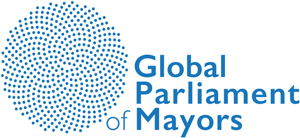Empowering Cities, Resilient Cities, Safe Cities and Inclusive Cities are the critical issues on the program of the GPM Annual Convening 2017.
Empowering Cities: The GPM advocates for the right of cities to self-governance and to act on critical issues impacting humankind. Cities do not need to ask for permission from their national counterparts to engage in global action. Where possible, cooperation is desirable. Where necessary, cities can take action collectively and on their own. Examples of cities taking action include city covenants to commit to Paris Agreement targets and cities of sanctuary to protect and care for undocumented migrants within national borders. At the convening, mayors will decide on strategies that can support and strengthen city decision-making power. Mayors will also discuss measures to maximize global urban priorities in the face of nationalist and protectionist policies.
Inclusive Cities: The GPM is committed to the principle of sanctuary for the world´s most vulnerable populations. Migration is one of the principle drivers of urbanization, with millions moving into cities every week. If well planned, migration can enhance the dynamism and productivity of cities. Unfortunately, many cities struggle and even falter to develop successful approaches to integrating these diverse populations. Precisely because they are open, cosmopolitan and pragmatic, cities must occupy the critical leadership role in shaping global action on social and cultural inclusion. At the convening mayors will commit to set an agenda for creating better integrated, more inclusive cities. The agenda set by the mayors will prioritize action items to take in the short- and long-term. Mayors Marvin Rees (Bristol) and Roshaan Wolusmal (Kandahar) will chair the mayor-to-mayor discussions, supported by Helge Lunde (ICORN),
Resilient Cities: The GPM is committed to taking action to prevent, mitigate and adapt to climate change. It advocates for global collective action. The recent decision of the U.S. President to withdraw from the Paris Agreement (COP21) underlines the imperative for cities to assume the lead on climate change, as many already are. A retreat to geopolitical isolationism and climate change denial will generate devastating consequences in our interdependent world. When nation states default on their sovereign responsibilities, cities have a responsibility to take action. At the convening, mayors from around the world will commit to widening and accelerating action on climate change and related threats to the global commons. They will identify ways to harness ongoing efforts of the C40, 100 Resilient Cities, ECLEI and UCLG, among others, to ensure common purpose.
Safe Cities: The GPM believes that achieving safer cities is not just a goal, but rather a fundamental right belonging to all urban residents. Cities must be places that are free from fear and insecurity. Insecurity in cities ranges from organized and petty crime to political and communal violence and terrorism. While there are common risks driving these various forms of urban insecurity, there are also important differences from city to city that must be considered. At a minimum, however, creating safe cities requires the security of people and property. At the convening, mayors will consider the practical strategies being designed and developed to prevent insecurity, and will endeavor to establish priorities across key sectors including urban planning, social services and education, policing and prisons.
The GPM Annual Convening 2017 will take place from 24 to 26 September in Stavanger, Norway. Register now!
